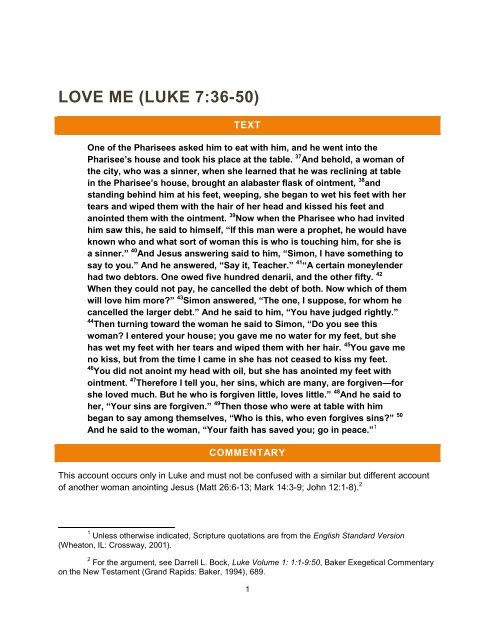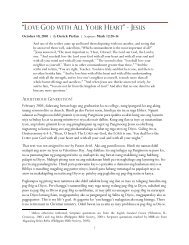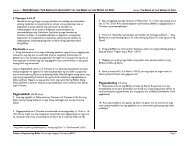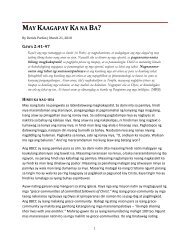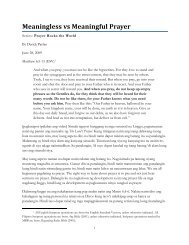LOVE ME (LUKE 7:36-50) - WordPress â www.wordpress.com
LOVE ME (LUKE 7:36-50) - WordPress â www.wordpress.com
LOVE ME (LUKE 7:36-50) - WordPress â www.wordpress.com
You also want an ePaper? Increase the reach of your titles
YUMPU automatically turns print PDFs into web optimized ePapers that Google loves.
<strong>LOVE</strong> <strong>ME</strong> (<strong>LUKE</strong> 7:<strong>36</strong>-<strong>50</strong>)TEXTOne of the Pharisees asked him to eat with him, and he went into thePharisee’s house and took his place at the table. 37 And behold, a woman ofthe city, who was a sinner, when she learned that he was reclining at tablein the Pharisee’s house, brought an alabaster flask of ointment, 38 andstanding behind him at his feet, weeping, she began to wet his feet with hertears and wiped them with the hair of her head and kissed his feet andanointed them with the ointment. 39 Now when the Pharisee who had invitedhim saw this, he said to himself, “If this man were a prophet, he would haveknown who and what sort of woman this is who is touching him, for she isa sinner.” 40 And Jesus answering said to him, “Simon, I have something tosay to you.” And he answered, “Say it, Teacher.” 41 “A certain moneylenderhad two debtors. One owed five hundred denarii, and the other fifty. 42When they could not pay, he cancelled the debt of both. Now which of themwill love him more?” 43 Simon answered, “The one, I suppose, for whom hecancelled the larger debt.” And he said to him, “You have judged rightly.”44 Then turning toward the woman he said to Simon, “Do you see thiswoman? I entered your house; you gave me no water for my feet, but shehas wet my feet with her tears and wiped them with her hair. 45 You gave meno kiss, but from the time I came in she has not ceased to kiss my feet.46 You did not anoint my head with oil, but she has anointed my feet withointment. 47 Therefore I tell you, her sins, which are many, are forgiven—forshe loved much. But he who is forgiven little, loves little.” 48 And he said toher, “Your sins are forgiven.” 49 Then those who were at table with himbegan to say among themselves, “Who is this, who even forgives sins?” <strong>50</strong>And he said to the woman, “Your faith has saved you; go in peace.” 1COM<strong>ME</strong>NTARYThis account occurs only in Luke and must not be confused with a similar but different accountof another woman anointing Jesus (Matt 26:6-13; Mark 14:3-9; John 12:1-8). 21 Unless otherwise indicated, Scripture quotations are from the English Standard Version(Wheaton, IL: Crossway, 2001).2 For the argument, see Darrell L. Bock, Luke Volume 1: 1:1-9:<strong>50</strong>, Baker Exegetical Commentaryon the New Testament (Grand Rapids: Baker, 1994), 689.1
THE PARABLE OF THE TWO DEBTORS (40-43)40-43 This gave occasion for another of Jesus' teaching moments. Simon listened to Jesusbecause he recognized him as a Teacher. Jesus told him of a parable about a certainmoneylender. Two debtors owe him huge amounts. One is five hundred denarii, the otherfifty. One denarius is equivalent to a day's wage of a laborer (Matt. 20:2). One owe ten timesthe other. But both of them have huge debts that they could not pay. In an act of grace, themoney lender cancelled the debt of both. Cancelled the debt is from charizomai. Clearly,Jesus was using this to illustrate forgiveness of sins (vv. 47-48). Paul also used this analogy ofdebt cancellation when talking about forgiveness of our sins. "And you, who were dead in yourtrespasses and the uncircumcision of your flesh, God made alive together with him, havingforgiven (charisamenos) us all our trespasses, by canceling the record of debt that stoodagainst us with its legal demands. This he set aside, nailing it to the cross" (Col. 2:13-14).Jesus then posed a question in v. 42, "Now which of them will love him more?" Love here isfrom agapaō. Simon correctly answered that the person whom a larger debt is cancelled willlove him more. Why is this word used here between the debtors and moneylender? Is it talkingabout affectionate relationship or gratitude or indebtedness? What kind of attachment is here?Or is it just looking forward to a kind of relationship that Jesus expects all "forgiven" disciples willhave for him? This is love and not mere gratitude or indebtedness.THE PARABLE EXPLAINED (44-47)44-46 Jesus here invites Simon to look at the woman's faith evident in the kind of affection shehas shown to Jesus. Simon was not to dwell at the woman's sinful past nor on his relativelybetter standing with God (which of course is not true because of his self-righteousness). Thecontrast between the two cannot be missed with a series of three contrasts (separated by "but"sin vv. 44, 45, 46). Water for my feet. Travelers would often get their feet dirty. Simon did notprovide Jesus water (or his servants might have), but the woman did more than this. Kiss. Acustomary greeting, Simon did not do this either. The woman did more, she kissed Jesus feet inhumble submission. Anoint my head with oil. A gesture of honoring one's guest or forrefreshing. Simon did not do this. The woman did much more in showing her utmost affection forJesus. The point is not the contrast of their actions, but the states of their heart, their love andaffection for Jesus. Again, Jesus was teaching here that in Christian discipleship, it is not aboutdoing certain things but relating to Jesus in repentance, faith, and love.47 Her sins which are many, have been forgiven, for she loved much; but he who isforgiven little, loves little. In contrast to what Simon was thinking about Jesus, he knew thatthis woman's sins are many. She does not deserve salvation. She does not deserveforgiveness. But she received it, like the debtor in Jesus' parable. Her sins...have beenforgiven. The tense is perfect, meaning that her forgiveness was <strong>com</strong>plete and she was nowenjoying the results of this forgiveness. For she loved much. The for (hoti) here should betaken not in the sense of "because" (signifying reason). If that is the case her love would be thebasis of forgiveness. That is not grace, and stands in contrast to the teachings of Jesus and3
Paul. Rather, it should be taken in the sense of "since" (signifying the evidence that sheexperienced forgiveness). The basis of forgiveness is not in the degree of love. We are notsaved by loving Christ. We are saved by trusting Christ (v. <strong>50</strong>, "Your faith has saved you.").Love is the evidence or the necessary result of a forgiven life. Faith in Jesus necessarily leadsto love for Jesus. The degree of love shows how much one recognizes the depth of God'sforgiveness. What's the point? It is not the quality of God's forgiveness, but one's recognition ofthe debt that God has cancelled. Every sinner has a great debt before God because of his sin.Simon should not be thought of as one who has lesser debts, but of someone who thought heowes God less than a prostitute. The only way we can appreciate the depth of Christ'sforgiveness is for us to see the magnitude of our offense against God and the magnitude of thelove of God which covers that sin in the cross of Christ.THE ASSURANCE (48-<strong>50</strong>)It was so sweet for the woman to hear Jesus’ words of affirmation, "Your sins are forgiven."The verb here is in the perfect tense signifying that the forgiveness extended to the woman wasalready a sealed deal and she was now enjoying and will continue to enjoy the benefits offorgiveness. Jesus declared that she will continue to be in a state of forgiveness. With thisstatement, the Pharisees who were with Nicodemus began saying among themselves, “Who isthis, who even forgives sins?” They know only God has the right to forgive sins. Jesus wasclaiming to have the same authority as God. The Pharisees, especially Simon, were nowconfronted with Jesus’ claim (like what he did also in 5:20-24). They cannot just continue invitingJesus to a party and listen to his teaching without acknowledging his divine authority andsubmitting to his lordship.Jesus’ last words to the woman, “Your faith has saved you; go in peace,” was both clearlywords of assurance to the woman and a lesson to the Pharisees. It was not the woman’s love orloving acts which saved her. It was not her tears, not her perfume, but her faith. She trusted inthe words of Christ and his promise of forgiveness. She can now go in peace, no more troubledby her guilt of past life but claiming the assurance of God's love in Christ. Even if others like thePharisees would condemn her, she now has no condemnation because she was alreadyforgiven in Christ. This was a lesson for all who would trust in their own works, that they shouldturn their faith in Christ, which would then produce peace. A disciple of Christ is one whorepents of his or her sin, trusted in Christ, forgiven, and loving Jesus with a love that is greaterthan anyone else (14:26).Derick Parfan (August 17, 2010)4


